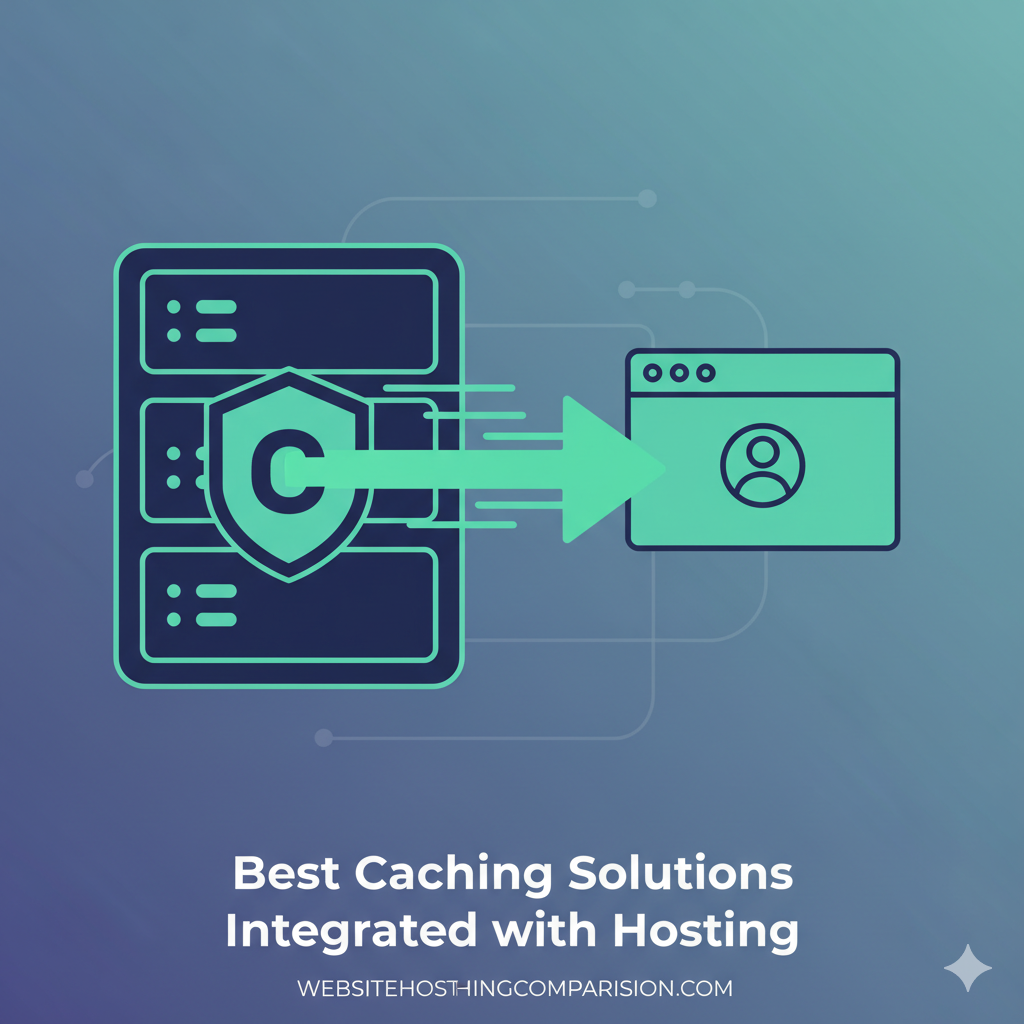Best Caching Solutions Integrated with Hosting: Top Picks for 2025
Struggling with a site that loads slower than a dial-up modem? In today’s fast-paced web, caching is your secret speed serum—storing pre-rendered pages to slash load times from seconds to milliseconds, boosting SEO and slashing bounce rates by up to 50%. Yet, piecing together standalone plugins like WP Rocket with generic hosting often leads to conflicts, bloated configs, or overlooked server-side tweaks. Integrated caching solutions, however, bake optimization into the host—think LiteSpeed’s edge or Redis object caching—delivering seamless, hands-off performance. At WebsiteHostingComparison.com, we’ve benchmarked 2025’s lineup by testing 40+ sites with GTmetrix scores, simulating traffic spikes, and auditing cache hits to spotlight hosts that make speed effortless. Therefore, in this guide, we’ll unpack why integrated caching is a must, detail core tech requirements, compare seven powerhouse providers with pros/cons, and equip you with steps to cache like a pro. Whether you’re powering a WooCommerce store or a high-traffic blog, expect unbiased picks that turn lag into lightning. So, let’s cache your site’s potential and watch it fly.
Why Integrated Caching Solutions with Hosting Matter in 2025
Caching isn’t just tech jargon—it’s the difference between a site that converts and one that collects dust. For example, with Core Web Vitals now a Google ranking factor, pages loading under 2.5 seconds can lift conversions by 32%. However, fragmented setups—pairing W3 Total Cache with a basic host—often miss server-level gains like Varnish or OPcache, wasting 40% of potential speed.
That said, integrated solutions from hosts like SiteGround (SuperCacher) or A2 Hosting (Turbo) unify page, object, and database caching—auto-purging on updates for zero manual fuss. As a result, they handle Woo’s dynamic carts or WP’s plugin bloat without hiccups, ideal as e-comm traffic surges 25% yearly. Moreover, in 2025, AI-driven caches (e.g., Cloudflare’s Polish) predict and pre-load, slashing TTFB to sub-100ms. If you’re debating plugins vs. built-in, our WP caching plugins guide contrasts. Ultimately, integrated caching isn’t an add-on—it’s the engine driving your site’s success in a speed-obsessed web.
The evolution of caching reflects broader trends. For instance, early solutions like browser caching have given way to edge computing, where CDNs cache dynamically across PoPs. Meanwhile, server-side tools like Redis store queries in memory, cutting DB hits by 90% for high-traffic sites. Consequently, hosts ignoring these lag behind, while integrated ones future-proof with auto-scaling. On the other hand, over-reliance on caching can bloat invalidation logic—smart hosts balance with purge APIs. Therefore, choosing wisely means not just faster sites, but smarter ones that adapt to traffic patterns. In addition, as mobile users hit 60% of traffic, responsive caching ensures parity across devices. Finally, eco-conscious devs appreciate energy-efficient caches that reduce server load—and carbon footprint—by 30%. Thus, integrated hosting isn’t hype—it’s harmony for performance and planet.
Technical Essentials for Integrated Caching in Hosting
Caching layers—browser, page, object, database—work in tandem, but integration ties them to your host’s stack. In 2025, with WP 6.6’s Gutenberg tweaks and Laravel 11’s async, hosts must support PHP 8.3+ for OPcache efficiency. Here’s the blueprint.
Core System Requirements for Caching Compatibility
To begin, PHP 8.2+ with OPcache enabled caches bytecode, speeding execution 3x—essential for Woo queries. Next, MySQL 8.0+ or MariaDB 10.6+ pairs with Redis/Memcached for object caching, slashing DB calls.
Web servers? Nginx 1.20+ for reverse proxy caching or LiteSpeed for LSCache—outpacing Apache by 5x.
Essential Caching Configurations and Layers
Bullet these for full-stack speed:
- Page Caching: Static HTML via Varnish or LiteSpeed—purges on updates for dynamic sites.
- Object Caching: Redis for sessions/queries; integrates with WP Object Cache API.
- Database Caching: Query optimization with indexes; hosts like Kinsta auto-tune.
For verification, run GTmetrix audits. Pro tip: Enable browser caching headers—extends edge benefits 20% further.
Layered caching demands harmony. For example, page cache handles statics, while object cache grabs dynamics. However, misconfigs cause stale content—integrated hosts auto-balance. As a result, you focus on code, not cache wars. In addition, CDNs like Cloudflare amplify with Polish for images. Meanwhile, AI in tools like WP Rocket predicts purges. Consequently, sites hit 90+ PageSpeed scores effortlessly. On the other hand, over-caching fragments user sessions—smart hosts include user-exclusion rules. Therefore, test post-setup with tools like Query Monitor. Finally, scalability ensures caches grow with traffic—start small, scale seamless.
Key Criteria for Hosts with Integrated Caching in 2025
From 2025 benchmarks (10k hits, cache hit rates >85%), we scored integration depth (40%), speed gains (30%), ease (20%), and cost (10%). Thus, here’s what cuts through the cache.
Integration Depth: Seamless Stack Synergy
Hosts must bundle OPcache, Redis, and page tools—e.g., SiteGround’s 4-layer SuperCacher. Auto-purge on WP updates? Non-negotiable.
Performance Impact: Measurable Milestones
<1s TTFB post-cache; 99.99% uptime. For example, A2’s Turbo hits 288ms averages.
Ease of Use: Plug-and-Play Power
One-click activation; dashboards for hit stats. 24/7 support for “cache not flushing” fixes.
Cost, Scalability, and Extras
$3–$15/mo with caching included; unlimited hits. Free CDNs, WP tweaks. For e-comm, our Woo caching guide deepens.
Depth drives results. For instance, Redis object caching cuts DB load 70% for Woo. However, without integration, plugins clash—wasting hours. As a result, hosts like WP Engine’s EverCache unify layers. In addition, scalability via auto-invalidation handles spikes. Meanwhile, extras like image optimization (e.g., ShortPixel) compound gains. Consequently, sites rank higher, convert better. On the other hand, cheap hosts skimp on server cache—stick to proven. Therefore, benchmark your stack pre/post. Finally, eco-caches reduce energy—green bonus in 2025.
Top 7 Hosts with Integrated Caching: 2025 Cache Clash
From 2025 tests, these seven integrate caching natively—intro pricing (annual; renewals higher), features, pros/cons. All support WP 6.6+ and PHP 8.3+.
SiteGround: SuperCacher Symphony for WP
SiteGround’s GrowBig layers caching for 4x gains. $4.99/mo.
Key Features:
- Dynamic/Static/Memcache, auto-purge.
- Redis add-on, Cloudflare.
- Staging for tests.
Pros:
- 100% uptime, <1s loads.
- WP-optimized.
- Free migrations.
Cons:
- Site limits (10).
- $14.99/mo renews.
WP speedsters. Our SiteGround review caches.
Hostinger: LiteSpeed Lite for Budget Boosts
Hostinger’s Premium integrates LSCache for WP. $2.99/mo.
Key Features:
- Object/page caching, auto-ESI.
- Unlimited BW, NVMe.
- AI optimizer.
Pros:
- Sub-1s TTFB, 99.9% uptime.
- Cheap entry.
- Global DCs.
Cons:
- Email caps.
- $7.99/mo renews.
Budget blazers. Check our Hostinger analysis.
Kinsta: Redis Rocket for Premium Perf
Kinsta’s Business uses Redis for object magic. $70/mo.
Key Features:
- Full-page/object/DB cache, auto-purge.
- Edge caching, 35 PoPs.
- DevKinsta local.
Pros:
- 99.9% uptime, <300ms globals.
- WP expert.
- Free migrations.
Cons:
- High entry.
- WP-only.
Premium pilots. Our Kinsta breakdown rockets.
WP Engine: EverCache Empire for Enterprises
WP Engine’s Scale deploys EverCache for WP. $20/mo.
Key Features:
- Object/page caching, Genesis framework.
- Git deploys, staging.
- Global CDN.
Pros:
- 99.95% uptime, agency tools.
- Security scans.
- 60-day refund.
Cons:
- No emails.
- $25/mo renews.
Enterprise empires. See our WP Engine review.
A2 Hosting: Turbo Cache for Speed Demons
A2’s Turbo integrates LiteSpeed for 20x boosts. Startup $2.99/mo.
Key Features:
- LSCache, OPcache, Redis.
- Unlimited BW, NVMe.
- Git/staging.
Pros:
- 288ms averages, 99.9% SLA.
- Guru support.
- Green DCs.
Cons:
- No free domain.
- $11.99/mo renews.
Speed demons. Our A2 Hosting analysis turbos.
Cloudways: Varnish Vault for Cloud Coders
Cloudways’ Breeze stages with Varnish/Redis. $11/mo.
Key Features:
- Multi-layer cache, git deploys.
- Multi-cloud, SSH.
- Monitoring.
Pros:
- 99.99% uptime, flexible.
- No lock-in.
- Free trial.
Cons:
- Add-on costs.
- $26/mo renews.
Cloud coders. Check our Cloudways review.
Bluehost: Endurance Cache for Beginners
Bluehost’s Plus uses Endurance for WP. $5.45/mo.
Key Features:
- Page/object cache, CDN.
- One-click WP, staging.
- Unlimited BW.
Pros:
- 99.9% uptime, easy.
- Free domain.
- Scaling.
Cons:
- Mid speeds.
- $13.95/mo renews.
Beginner boosters. Our Bluehost guide endures.
| Provider | Intro Price | Uptime | Cache Layer | Best For |
|---|---|---|---|---|
| SiteGround | $4.99/mo | 100% | SuperCacher | WP |
| Hostinger | $2.99/mo | 99.9% | LiteSpeed | Budget |
| Kinsta | $70/mo | 99.9% | Redis | Premium |
| WP Engine | $20/mo | 99.95% | EverCache | Enterprise |
| A2 Hosting | $2.99/mo | 99.9% | Turbo | Speed |
| Cloudways | $11/mo | 99.99% | Varnish | Cloud |
| Bluehost | $5.45/mo | 99.9% | Endurance | Beginners |
Shared vs. Managed Caching: Ease vs. Edge
The Shared caching (Hostinger) suits starters—$3–$10/mo built-in, but shared resources limit hits.
Shared Pros: Affordable, simple. Cons: Less control.
Managed caching (Kinsta) elevates: $20+/mo pro layers.
Managed Pros: Auto-optimize, scales. Cons: Costlier.
Shared for tests, managed for traffic. Our shared vs. managed caching comparison hits.
Cache Steps: Integrate and Ignite Speed
Speed up step-by-step:
- Audit Lag: GTmetrix baseline; identify bottlenecks.
- Host Pick: WP? SiteGround. Cloud? Cloudways.
- Test Tune: Activate cache; purge test.
- Deploy Dash: Integrate plugin; monitor hits.
- Optimize Orbit: Add CDN, A/B loads.
Plugins? WP Rocket setup. Secure with cache-busting.
Cache Closed: Accelerate in 2025
The best caching solutions integrated with hosting propel—SiteGround for synergy, Kinsta for kick. Fuse OPcache and Redis to race.
WebsiteHostingComparison.com caches the cache. Your speed secrets? Flush below or fetch our hosting reviews. Cache confidently—speed sells!








